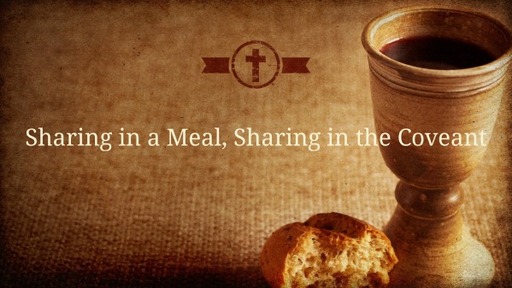Sharing in a Meal, Sharing in the Coveant

Sermon • Submitted • Presented • 16:03
0 ratings
· 128 viewsFiles
Notes
Transcript
Sermon Tone Analysis
A
D
F
J
S
Emotion
A
C
T
Language
O
C
E
A
E
Social
As we head into the holiday season, one of things that many people look forward to is the food, especially when shared around a table with friends or family. I think we’re losing some of that sense of togetherness these days. I’ve seen at restaurants families at a table where each person is on their phone, texting, playing a game, or doing something else as they eat. We’re forgetting that for most of human history sharing a meal was an important way of establishing and strengthening bonds of relationship.
In the gospels we often read of Jesus sharing meals with people – with His disciples, with scribes and Pharisees, and tax collectors and others who were considered sinners. The most important is probably that last meal Jesus had with the disciples before His arrest and death.
While they were eating, Jesus took bread, gave thanks and broke it, and gave it to his disciples, saying, “Take and eat; this is my body.” Then he took the cup, gave thanks and offered it to them, saying, “Drink from it, all of you. This is my blood of the covenant, which is poured out for many for the forgiveness of sins. I tell you, I will not drink of this fruit of the vine from now on until that day when I drink it anew with you in my Father’s kingdom.”
Sharing a meal
Sharing a meal
Eating together was, and still is, an important occasion. To invite someone to a meal was an honor. It was giving some of your food to others. It was an offer of peace, trust, brotherhood and forgiveness; in short, sharing a table meant sharing a life. To eat a meal with someone meant that one was willing to accept that person as family.
Jesus shared meals with all sorts of people.
Making a covenant
Making a covenant
Last meal was a reminder of the exodus and the covenant God made at Sinai. At its center was the lamb, representing the sacrifice which saved the people from the Angel of Death and then the later one which established the covenant.
A covenant created a bond between two parties
God made several covenants with the people of Israel
Passover
God’s promise of a new covenant
“The time is coming,” declares the Lord, “when I will make a new covenant with the house of Israel and with the house of Judah.
Jesus fulfills the promise
Gave Himself for us
When we come together as God’s people we make a covenant with each other, part of which reads:
We further engage to watch over one another in brotherly love; to remember each other in prayer; to aid each other in sickness and distress; to cultivate Christian sympathy in feeling and courtesy in speech; to be slow to take offense, but always ready for reconciliation, and, mindful of the rules of our Saviour, to secure it without delay.
While we no longer have blood sacrifices, we make sacrifices in other ways – of our time, our interests, our resources.
Participating in the covenant
Participating in the covenant
When we come to the Lord’s table we are reaffirming our commitment to being in the new covenant which Jesus established.
Unifies us with Jesus
Is not the cup of thanksgiving for which we give thanks a participation in the blood of Christ? And is not the bread that we break a participation in the body of Christ? Because there is one loaf, we, who are many, are one body, for we all partake of the one loaf.
With His resurrection, Jesus guarantees to us His presence – here, now. “I will be with you always ,,,” When we gather in His name He is with us (Matt. 18:20)
Commits us to being His disciples
We are now God’s people, called to live by His values and priorities
We are no longer our own
Unifies us with each other
Mutual care
Mutual support
Mutual ministry
Continuing the Jesus’ work of the kingdom
Giving ourselves for others
While on a tour of California's giant sequoias, the guide pointed out that the sequoia tree has roots just barely below the surface. "That's impossible!" I exclaimed. "I'm a country boy, and I know that if the roots don't grow deep into the earth, strong winds will blow the trees over." "Not sequoia trees," said the guide. "They grow only in groves and their roots intertwine under the surface of the earth. So, when the strong winds come, they hold each other up." There's a lesson here. In a sense, people are like the giant sequoias. Family, friends, neighbors, the church body and other groups should be havens so that when the strong winds of life b ow, these people can serve as reinforcement and can strive together to hold each other up.
As we celebrate communion we remember what God has done for us. The giving of the loaf and the cup represent God giving pure, unbounded love to the church and to the world.
When we eat the bread and drink the cup, we not only embrace God’s love, we also make a commitment to live in love with others. God has given to us. Now we give, demonstrating God’s love to others. Will your gift to others through the church represent the depth and breadth of God’s love?
